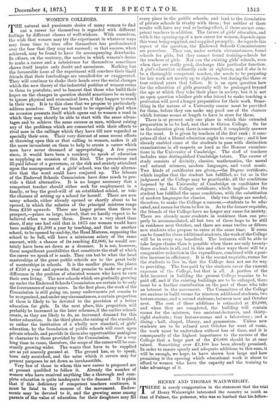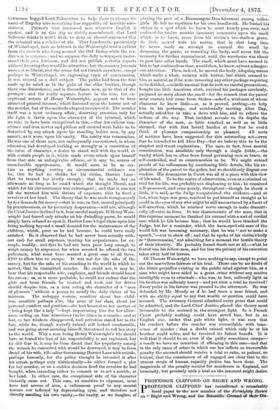HENRY AND THOMAS WAINWRIGHT.
THERE is surely exaggeration in the statement that the trial of Henry Wainwright interested the country as much as that of Palmer, the poisoner, who was so loathed that his fellow- townsmen begged Lord Palmerston to help them to change the name of Rugeley into something less suggestive of horrible asso- ciations. Palmer's trial interested men wherever English is spoken, and is to this day so vividly remembered, that Lord Selborne thinks it worth while to deny an absurd statement that the criminal was a relative of his. That Londoners, particularly of Whitechapel, took an interest in the Wainwright trial is evident from the crowds who hung around the Old Bailey while the ver- dict was in suspense; and we suppose the daily newspapers under- stood their own business, and did not publish verbatim reports without knowing they would be attractive; but the country journals were not so liberal, and the crime did not furnish anywhere, except perhaps in Whitechapel, an engrossing topic of conversation. It was treated as a dull subject. The public had from the first made up its mind as to the guilt of the elder brother, though there was discordance, and is discordance now, as to that of the younger ; and the really separate feature in the case, the ex- ceptional nature of Henry Wainwright, appears not to have attracted general interest, which fastened upon the horror not of the murder, but of the methods adopted to conceal it. The murder itself was a most ordinary affair, deserving attention only for the light it threw upon the character of the criminal, which we take to have been exceptional in this,—that his callous con- science and iron nerves and pitiless self-control were liable to be disturbed by any attack upon his standing before men, by any assault, as it were, upon his vanity. His vanity was remorseless. He:was one of those men, not unfrequently encountered, in whom education had developed nothing so strongly as a conviction of the value of character, a desire to stand well with the world, or with certain people in it, which made every attack upon himself from that side an unforgivable offence, or it may be, source of unendurable apprehension. It would seem to be as cer- tain as anything resting on circumstantial evidence can be, that he had no dislike for his victim, Harriet Lane ; that he treated her kindly enough ; that he made her an allowance as long as he could which she thought liberal, and which for his circumstances was extravagant ; and that it was not till she worried him with threats of exposure, that he fired a revolver at her head. The theory that he was made savage merely by her demands for money—that he was, in fact, moved principally by penuriousness, or by pecuniary desperation—will not, although the Chief Justice inclined to it, bear careful analysis. If Henry Wain- wright had feared only attacks on his dwindling purse, he would simply have refused to open it, Harriet Lane's legal claim upon him being nothing beyond a small demand for the maintenance of the children, which, poor as he had become, he could have easily satisfied. Be it observed that he had never been actually with- out cash for small expenses, treating his acquaintance, for ex- ample, readily ; and that he had not been poor long enough to weigh money by sixpences, for when arrested he offered the two policemen, what must have seemed a great sum to all three, £200 to allow him to escape. It was not for the sake of the money, but for the sake of his standing in the world in which he moved, that he committed murder. He could not, it may be, bear that his respectable wife, employer, and friends should know his career ; ow, as is more probable, he could not endure that the girls and loose friends he treated and took out for drives should despise him, as a man acting the character of a " man of pleasure " without a penny to satisfy the daily claims of his mistress. The unhappy woman, sensitive about her child- ren, sensitive perhaps also, like most of her class, about her personal comfort and position—she had boasted to her mother of " being kept like a lady "—kept importuning him for her allow- ance, calling on him sometimes twelve times in a month ; and at last, as her trinkets disappeared, and privation stared her in the face, while he, though secretly ruined, still looked comfortable, and was going about amusing himself, threatened to tell her story to the world. Why a man living Henry Wainwright's life should have so feared the loss of his respectability is not explained, but he did fear it, it may be from dread that his popularity among the women he consorted with would be destroyed, it may be from dread of his wife, till—after threatening Harriet Lane with suicide, perhaps honestly, for the police thought he intended it after his arrest, perhaps only histrionically—he either formed a plot for her murder, or on a sudden decision fired the revolver he had bought, when intending either to commit or to act a suicide, at her head. In either case, the exceptional side of his character instantly came out. This man, so sensitive to exposure, must have had nerves of iron, a callousness proof to any mental torture not inflicted by depreciating eyes, and therefore not directly assailing his own vanity,—the vanity, as we imagine, of
' playing the part of a Brummagem Don Giovanni .among ballet- girls. He felt no repulsion for his own handiwork. He buried his victim in a spot which he knew he must hourly pass over, and endured for twelve months incessant comments upon the smell which, as he knew, arose from his victim's too-shallow grave. So little moved were his nerves, that in that long time he never made an attempt to conceal the smell by deepening the grave, or removing the body, and never felt the necessity for further concealment until the warehouse was about to pass into other hands. The smell, which must have seemed to him to last a miraculous time, would then, he knew, attract adanger- ous attention. Then, indeed, he moved the body, adopting means which strike a whole country with horror, but which seemed to him as natural as if he were removing any other package requiring to be divided,—so little unusual that he took no careful precautions, bought too little American cloth, covered his packages carelessly, prepared no story about the smell —for the remark that the parcel must contain hair came from Stokes—asked a workman of whose character he knew little—or, as it proved, nothing—to help him in his porterage, and accidentally meeting Alice Day, actually asked her to take a drive with him, and so relieve the tedium of the way. That incident reveals to its depths the character of the man, so little touched as well as so little alarmed, that with that horrid burden at his feet he could think- of pleasant companionship as pleasant. All sorts of motives have been suggested for this astounding act--even that he intended to kill Alice Day—but we believe this to be the simplest and truest explanation. The man, in fact, from mental constitution, was assailable only through a single foible,—the vanity which has so often been found governing men as brave, as self-controlled, and as conscienceless as he. We might extend proofs of his callousness by mentioning little details, like his ex- planation of the parcel to the police, but we should only disgust our readers. His demeanour in Court was all of a piece with this view of his mind. To be the centre of observation, even as a criminal on trial for his life, was probably not displeasing to him; he remained self-possessed, and even jaunty, throughout—though he shook a little, it is said, as the Judge recapitulated the evidence—and at last, when hope was gone, resolved to put himself as straight as he could in the eyes of any who might be still unconvinced by a burst of self-assertion, which he retained nerve enough to make dramati- cally effective in form. It was characteristic of the man, that in this supreme moment he thanked his counsel with a sort of cordial ease which he felt became him ; that he would have thanked the Judge, but for a reminder, which the keen-eyed old man of the world felt was becoming necessary, that he was " not to make a speech,"—not to show off ; and that he spoke of his victim's body as "these remains," not admitting for a moment the hostile theory of their identity. He probably feared death not at all,—what he feared was his fellow-men, and for him the privacy of his execution takes away half its terrors.
Of Thomas Wainwright we have nothing to say, except to point out the marvellous fairness of his trial. There can be no doubt of the bitter prejudice existing in the public mind against him, as a man who might have aided in a great crime without any motive intelligible even to criminals —who was, in fact, callously light as his brother was callously heavy — and yet what a trial he received Every point in his favour was pressed to the uttermost. He was defended by Mr. Moody as if he had been a near friend, and with an ability equal to any that wealth or position could have secured. The Attorney-General admitted every point that could be admitted, and the Lord Chief Justice placed the theory most favourable to the accused in the strongest • light. In a French Court probably nothing could have saved him, but in an English one, under that pale white light, it was seen that his conduct before the murder was reconcilable with inno- cence of murder ; that a doubt existed which only he or his brother could solve, and he received its fullest benefit. It is well that it should be so, even if the guilty sometimes escape- e result we have no intention of affirming in this case—and that in the only cases of crime in which our law inflicts an irreversible penalty the accused should receive a trial so calm, so patient, so lenient, that the consciences of all engaged are clear that to the utmost strain of human capacity justice has been done. The magnitude of the penalty secures for murderers in England, not immunity, but precisely such a trial as the-innocent might desire.







































 Previous page
Previous page